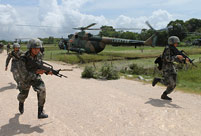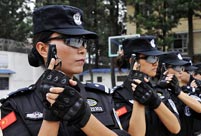DAMASCUS, Aug. 29 -- The United States and its allies are pressing ahead with plans for punitive military attack on Syria as the U.N. chemical investigation team was still probing the alleged use of chemical weapons in Syria.
But at the same time, more and more countries have joined those opposing military intervention in the Mideast country, which has been dired in a conflict for nearly two and half years.
Amid signs that the U.S. is ready to attack Syria, 140 members of the U.S. House of Representatives have signed onto a letter, demanding President Barack Obama get authorization of Congress before going ahead with the military strike.
"We strongly urge you to consult and receive authorization from Congress before ordering the use of U.S. military force in Syria," said the letter.
In the past days, the Obama administration has been preparing for a military strike on Syria, in response to the Syrian government's alleged use of chemical weapons in the eastern suburbs of Damascus on Aug. 21, which reportedly killed 1,300 people.
As part of his ongoing consultations with allies, Obama called German Chancellor Angela Merkel Thursday to discuss the Syria situation and possible international response.
Merkel has been stressing that she hopes to see a comprehensive political solution to the conflict. But her administration said "the Syrian government cannot hope to continue this kind of illegal warfare and go unpunished."
Obama also conversed over the phone with British Prime Minister David Cameron, the major U.S. ally in its previous wars in Iraq and Afghanistan,to coordinate their positions on Syria.
British MPs vetoed Thursday a possible military action against Syria after eight hours of intense debate. Cameron said he would "act accordingly" after the 285 to 272 vote, dealing a setback to U.S.-led efforts to punish Damascus.
Reacting to Washington's calls for military arrack on Syria, Russia has repeatedly voiced against possible military intervention in the country, saying it would undermine efforts for a political settlement and destabilize the Middle East.
Russia has rejected U.S. accusations that the Syrian government was behind last week's claimed chemical attack.
Meanwhile, Canadian Prime Minister Stephen Harper said Thursday Canada has no plans for a military mission of its own in Syria, although the government supports its allies and has been convinced of the need for "forceful action."
Also on Thursday, Dutch government adviser Andre Nollkaemper said any intervention in Syria without a mandate from the U.N. Security Council is prohibited under international law.
Bulgaria insisted on political dialogue and political solution for Syria and his country will not participate in direct warfare, Bulgarian Defense Minister Angel Naydenov said.
In addition, Czech caretaker government head Jiri Rusnok said he is against the possible air attack on Syria as it has no legal grounds and will not resolve the conflict.
Czech President Milos Zeman and Bolivia's President Evo Morales denounced a potential U.S.-led military intervention in Syria.
Moreover, Iraqi Prime Minister Nuri al-Maliki said Thursday his country opposes any military action on Syria, affirming Iraq's support for a political solution to the Syria crisis.
With military intervention looming, Syrian Defense Minister Fahed al- Fraij said Thursday his country's army will "decisively" respond to any form of foreign military action.
Earlier in the day, Syrian President Bashar al-Assad said the threats of military action on his country would only make it more adherent to its rooted bases and independent decision.
The U.N. chemical investigation team is currently probing the alleged use of chemical weapons in Syria upon the request of the Syrian government.
 Weekly selection of world photos (Aug.19-Aug.24)
Weekly selection of world photos (Aug.19-Aug.24) Army aviation brigade in actual-troop drill
Army aviation brigade in actual-troop drill Top 10 Chinese provinces for the well-heeled
Top 10 Chinese provinces for the well-heeled  Baby born to save his sister - the story of a savior sibling
Baby born to save his sister - the story of a savior sibling Lady of mystery: Female SWAT team in prison disclosed
Lady of mystery: Female SWAT team in prison disclosed  Single mother, baby live in KFC restaurant for months
Single mother, baby live in KFC restaurant for months Fan Bingbing poses for Malaysian magazine Citta Bella
Fan Bingbing poses for Malaysian magazine Citta Bella Zhang Xinyi covers COSMOPOLITAN
Zhang Xinyi covers COSMOPOLITAN A collection of bizarre rooftop buildings around China
A collection of bizarre rooftop buildings around China 100th birthday of 'Little Mermaid'
100th birthday of 'Little Mermaid' China, U.S. conduct joint anti-piracy drill
China, U.S. conduct joint anti-piracy drill  'Abandoned' life in cement boats in Huai River
'Abandoned' life in cement boats in Huai River 2013 Taiwan Int'l Tourism Expo kicks off in Taipei
2013 Taiwan Int'l Tourism Expo kicks off in Taipei Photo story: Take a gap year
Photo story: Take a gap year Nokia's Global Headquarters: visiting a declining empire
Nokia's Global Headquarters: visiting a declining empireDay|Week|Month